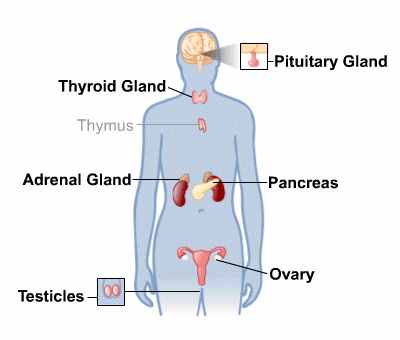Vitiligo And Internal Secretion System
 Internal secretion system is a intracorporal information transmission system composed by secretory gland and some organs’ endocrine cell, which has close relation with nervous and immune systems. They coordinate with each other and adjust the body’s physiological activity together to maintain the internal environment’s relative stability. Hormone, a kind of high-effect active substances secreted by endocrine gland and endocrine cell, plays a role by interstitial fluid
Internal secretion system is a intracorporal information transmission system composed by secretory gland and some organs’ endocrine cell, which has close relation with nervous and immune systems. They coordinate with each other and adjust the body’s physiological activity together to maintain the internal environment’s relative stability. Hormone, a kind of high-effect active substances secreted by endocrine gland and endocrine cell, plays a role by interstitial fluid
and blood transmission. Experimental investigation shows that melanocyte-stimulating hormone,
adrenocorticotropic hormone, sex hormone can promote melanin synthesis and metabolism. And glucocorticoid, epinephrine, noradrenaline, thyroxine, melatonin will inhibit melanin metabolism and synthesis. These all indicate that vitiligo has close relation with internal secretion.
Melanocyte stimulating hormone: some researches indicate that, human melanocyte stimulating hormone may be secreted by adenohypophysis, divided to be two kinds, α and β. α melanophore has no difference, and has no effect to melanophore or the effect is not obvious. And β melanophore has interspecific difference and has relation with pigment proliferative disorders.
Corticosteroid hormone: It is secreted by adrenal cortex. The common synthetic corticosteroid hormone includes prednisone dexamethasone and hydrocortisone. In normal condition, melanin in blood FSH and glucocorticoid levels is relative balance, once in the imbalance, the skin color will be affected.
Adrenocorticotropic hormone: It is secreted by prepituitary gland. In clinic, after using adrenocorticotropic hormone, the original pigment nevus will be deepened. And then generate new pigmented nevus. Local application will make skin color deepen. These may be because adrenocorticotropic hormone has melanin.
Epinephrine and norepinephrine: these can inhibit melanin stimulant’s effect on vitro frog skin melanin cells.
Thyroxine: it is secreted by thyroid, including tetraiodothyronine and triiodothyronine. They are the monoiodide of tyrosine.
Sex hormone: including estrogen, progestin activate your tyrosinase, promote your melanophore to synthesize melanin.
Melatonin: it can combine with specific receptors to make skin colour fade.
Prostaglandin: It can stimulate melanophore increase and promote melanin synthesis.



Leave a Comment